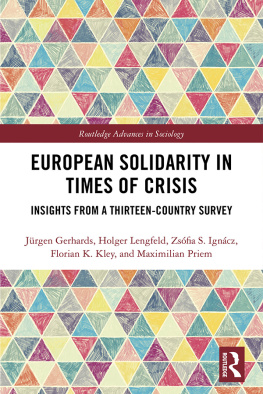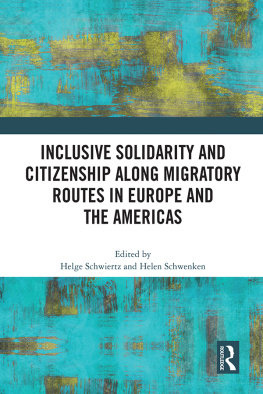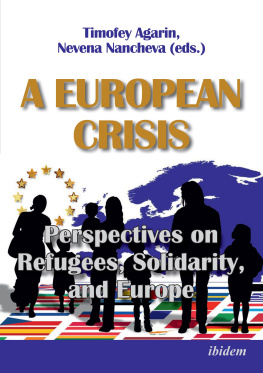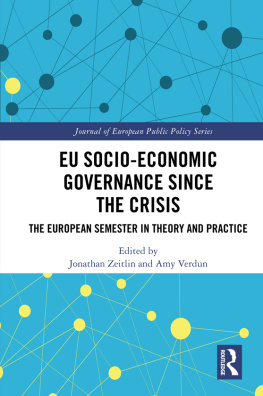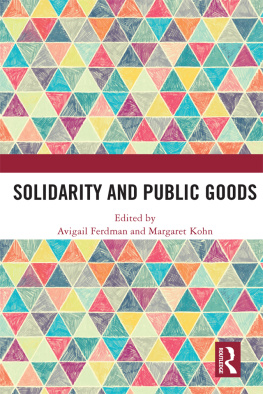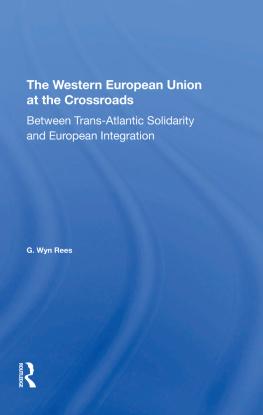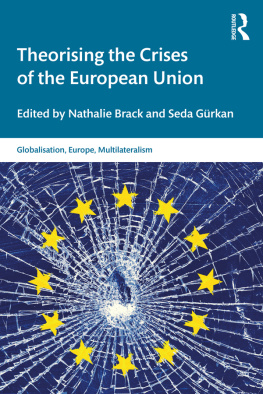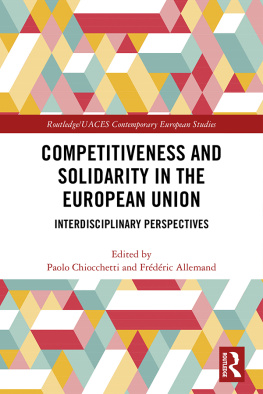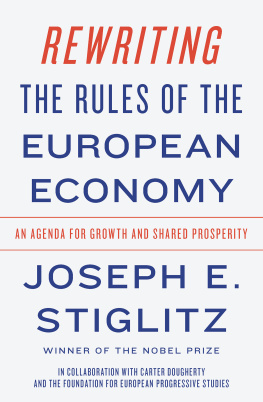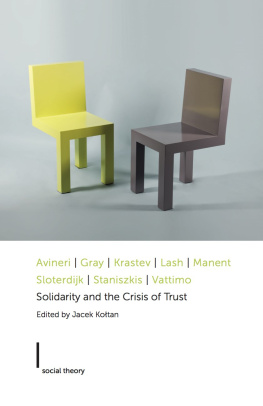Contents
Guide
Print Page Numbers

Could and should the EU become more solidaristic? This is a key question for all Europeans. To move beyond superficial answers, we need to clearly spell out the meaning of EU solidarity and then tap citizens orientations. This volume makes a fundamental step forward in this direction. It distinguishes between fiscal, territorial, welfare and refugee solidarity and finds a surprisingly high popular support for enhancing the caring mission of the EU. The authors offer not only an innovative and rich analytical framework but also invigorating signals for all those who have not lost faith in the European project.
Maurizio Ferrera, Professor of Political Science,
Universit degli Studi di Milano
I believe that the political elites first and foremost the despondent social democratic parties underestimate the disposition of their voters to engage themselves for projects reaching beyond narrow self-interest. The fact that this view isnt just a reflection of unfulfilled philosophical ideals can be seen in the most recent publication by the research group led by Jrgen Gerhards and Holger Lengfeld, who for years has pursued wide-ranging and intelligent comparative studies on solidarity in thirteen EU member states. They have not only found indicators for a shared European identity distinct from national identity, but also an unexpectedly high willingness to support European policies that would imply redistribution across national boundaries.
Jrgen Habermas, Professor Emeritus of Philosophy,
Goethe Universitt Frankfurt am Main
European Solidarity in Times of Crisis is a superb contribution to the literature on the dynamics of social transformation in Europe and to the sociology of the European Union. At a time when nationalist populism is on the rise, it demonstrates that the vast majority of European Union citizens feel a strong sense of obligation toward other Europeans. Through rigorous and reader-friendly empirical analysis of a public opinion survey conducted in thirteen countries, Jrgen Gerhards and his co-authors correct the impression conveyed by the media of a European Union corroded by national egoism.
Juan Dez Medrano, Professor of Sociology,
Universidad Carlos III de Madrid
Remarkably, in a time of apparent nationalist renaissance this volume provides us with an optimistic message for European integration Europes citizens are actually much more solidary with citizens of other EU countries than many social scientists and politicians tend to presume. The data from thirteen countries show that Europe is a space of solidarity in terms of sharing wealth, income, and fiscal resources. Even if European solidarity is more problematic in terms of sharing refugees, and even if solidarity might generally be more conditional than these data suggest at first sight, this volumes message comes at the right time and its importance cannot be overestimated.
Hanspeter Kriesi, Professor of Comparative Politics,
European University Institute, Florence
European Solidarity in Times of
Crisis
The euro crisis, several sovereign debt crises, the Great Recession, the refugee crisis, and Brexit have all challenged Europeans willingness to show solidarity with other European citizens and member states of the European Union. European Solidarity in Times of Crisis provides a clear theoretical framework to understand European solidarity for the first time. It offers a systematic empirical approach to determine the strength and causes of European solidarity. The authors distinguish between four domains of solidarity and test a set of theoretically derived criteria with a unique data set to investigate European solidarity.
Based on a survey conducted in 13 EU member states in 2016, the empirical analysis leads to some unanticipated results. Europeans display a notably higher degree of solidarity than many politicians and social scientists have presumed so far. This especially applies to the support of people in need (welfare solidarity) and the reduction of territorial disparities between rich and poor EU countries (territorial solidarity), but also to the domain of fiscal solidarity (financial support of indebted EU countries). This optimistic view is less true for the domain of refugee solidarity. While citizens of western and southern EU countries accept the accommodation of refugees and their allocation between European countries, the majority of people in eastern European countries do not share this point of view.
The book will appeal to students and scholars in fields such as comparative sociology, political science, social policy and migration research, and European studies. It is also relevant to a non-academic audience interested in the development of the European project.
Jrgen Gerhards is Professor of Sociology at the Freie Universitt Berlin. His research interests include comparative cultural sociology and sociology of European integration. His most recent publications include Global Inequality in the Academic System: Effects of National and University Symbolic Capital on International Academic Mobility (Higher Education, 2018, with S. Hans and D. Drewksi); Social Class and Transnational Human Capital. How Upper and Middle Class Parents Prepare Their Children for Globalization (Routledge, 2017, with S. Hans and S. Carlson); European Citizenship and Social Integration in the European Union (Routledge, 2015, with H. Lengfeld); Transnational Linguistic Capital: Explaining English Proficiency in 27 Countries (International Sociology, 2014); European Integration, Equality Rights and Peoples Beliefs (European Sociological Review, 2013, with H. Lengfeld); From Hasan to Herbert: Name Giving Patterns of Immigrant Parents between Acculturation and Ethnic Maintenance (American Journal of Sociology, 2009, with S. Hans); Free to Move? The Acceptance of Free Movement of Labour and Non-Discrimination among Citizens of Europe (European Societies, 2008).
Holger Lengfeld is Professor of Sociology at Leipzig University and Research Fellow at the German Institute of Economic Research Berlin. His research focuses on social stratification, inequality, and European social integration. Among his publications are Does Physiological Distribution of Blood parameters in Children Depend on Socioeconomic Status? Results of a German Cross-sectional Study (BMJ Open, 2018, with K. Rieger, M. Vogel, C. Engel, U. Ceglarek, K. Harms, U. Wurst, M. Richter, and W. Kiess); Drifting Apart or Converging? Grades of Non-traditional and Traditional Students over the Course of Their Studies (Higher Education, 2017, with T. Brndle); Do European Citizens Support the Idea of a European Welfare State? (International Sociology, 2016, with J. Gerhards and J. Huberer); The Long Shadow of Occupation: Volunteering in Retirement (Rationality and Society, 2016, with J. Ordemann); European Citizenship and Social Integration in the European Union (Routledge, 2015, with J. Gerhards); The Growing Remit of the EU in Climate Change Policy and Citizens Support across the Union (Journal of European Social Policy, 2008, with J. Gerhards).
Zsfia S. Igncz is a lecturer and researcher at the Institute of Sociology, Goethe Universitt Frankfurt am Main, Germany. Her main research interests include social justice and methodological topics. Her most recent publications are The Remains of the Socialist Legacy: The Influence of Socialist Socialization on Attitudes toward Income Inequality (Societies, 2018); Social Cohesion and Its Correlates (

